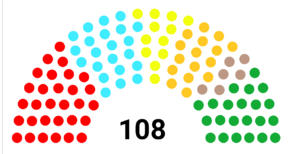Politics of Mecklenburg
Mecklenburg is a unitary city-state, governed as a devolved administration within the MRT. The head of state is the Mayor, tarheelscouse, whilst the leader of the largest party in the Serme (the legislative lower house) acts as head of government.
Mecklenburg has a multi-party system, and coalition governments are the norm; the largest party is expected to form a coalition with a majority of members in the Serme.
The most prominent political party in Mecklenburg has traditionally been the Social Democratic Party, although the most recent July 2017 election saw their support eroded somewhat, mostly in losses to the Labour Party and the Transport Democratic Party. Opposition parties include a wide variety of political standpoints.
Political system
The Mayor
The Mayor of Mecklenburg serves as the head of state, and has considerable power over government. They are required to change their affiliation to whichever party is largest in the Serme, though this has so far always been the SDP, a party the incumbent mayor actually founded.
The Mayor generally acts with consultation from the Serme, to which he is constitutionally responsible. Equally, the Mayor often has considerable input in legislation passing through the Lower House.
The Serme
The Serme is a chamber of 108 seats which serves as the most important facet of the legislative branch of government. A majority of 55 seats is needed to form a government, although Mecklenburg's system of proportional representation means that a single party having an absolute majority is very unlikely. In general, the party with the plurality is expected to form a coalition of 55 seats or more, which then acts as a single government.
The Serme is seated in the Tarlem (Mecklenburg City Hall), right in city centre. Parliamentary terms generally last 3 to 6 months.
The Armàn / Armäcne
The Armàn (feminine form armäcne) is the Leader of the Serme (generally termed Armàn iy Zerme / Armäcn'iy Zerme). The leader of the largest elected party assumes this position and is generally seen as being second in command to the Mayor.
Elections and political parties
Electoral system
Elections are held in Mecklenburg at a minimum of every six months. Should a government be dissolved early, a snap election is called.
Elections have previously been held under single transferrable vote, but as of the last election, Mecklenburg now uses direct proportional representation under the D'Hondt distribution method. Local wards, which used the VPS System, have been abolished in favour of a citywide proportional system.
Political parties
Mecklenburg has traditionally been a safe SDP seat, though SDP governments have long relied on the Labour Party and occasionally the Transport Democratic Party to form a majority. The recent switch to direct proportional representation, however, has eroded this support somewhat, with the Centralist and MRT Green parties garnering a higher seat share than ever before.
Voting eligibility
All MRT server members who have a residence or business within city limits are eligible to vote. Members who do not own property but who are employed in Mecklenburg may also be eligible. Equally, those who have a home or business that is removed remain eligible to vote, even without current assets in city limits.
In general, property owners are automatically added to the electoral register. If this is not the case, eligible MRT citizens should contact the Mayor for further advice.
Election Results
July 2017 Election
The July 2017 Election returned the following results:
| Party | Role | No. of seats | Leader |
|---|---|---|---|
| SDP | Coalition Leader | 30 | Mineman |
| Labour | Coalition Member | 22 | TBC |
| TDP | Coalition Member | 12 | TBC |
| Green | Opposition Member | 22 | TBC |
| Centralist | Opposition Member | 16 | TBC |
| Federalist | Opposition Member | 6 | TBC |
